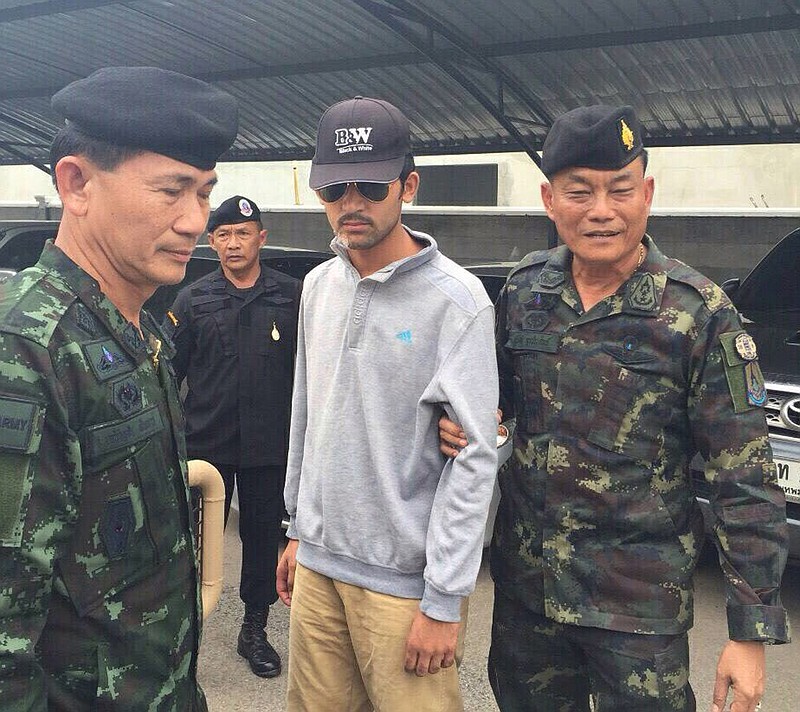BANGKOK -- Thai police said Wednesday that the fingerprints of a foreign man arrested at Thailand's border with Cambodia match those found on a bottle containing bomb-making material, as the investigation into last month's deadly bombing in Bangkok gathered steam.
National police spokesman Prawut Thavornsiri said authorities were still conducting DNA tests but could determine that "this man is important and is related or conspired with people who committed" the Aug. 17 bombing at the Erawan Shrine in central Bangkok. The blast left 20 people dead, more than half of them foreigners, and over 120 injured.
The investigation into the attack has picked up in recent days with the arrest of two suspects and raids on two apartments on the outskirts of Bangkok that contained bomb-making materials.
In the first apartment, raided Saturday in the Bangkok neighborhood of Nong Chok, police arrested a suspect they described as a foreign man and seized bomb-making equipment that included detonators, ball bearings and a metal pipe believed to be a bomb casing.
They also took fingerprints from the apartment, which turned out to match those of another suspect arrested Tuesday at the border with Cambodia, Prawut said.
"We can confirm that the man's fingerprints match with those found on a bottle that contains a bombing substance," Prawut said, and then added, "He could be the one who brought the bomb out of this apartment or he could have brought the bomb to the crime scene."
Prawut said that further testing, including DNA tests, were being conducted to bolster that theory.
Both suspects who have been arrested are being interrogated by the military and have not yet been charged.
When authorities announced the arrest Tuesday of the suspect at the border, they described him as bearing resemblance to a man spotted in surveillance video at the shrine who is believed to have planted the bomb. The suspect seen in the video, wearing a yellow T-shirt, is carrying a backpack that he places on a bench before leaving.
Prime Minister Prayuth Chan-ocha told reporters that the arrested man is a foreigner who appeared to be trying to escape across the border.
No one has publicly claimed responsibility for the attack, sparking an array of theories about who might be behind it.
Speculation has grown that the suspect might be part of a group seeking to avenge Thailand's forced repatriation of ethnic Uighurs to China in July. Prayuth on Monday linked the two theories, suggesting the bombers might have been involved in smuggling Uighurs out of China.
The prime minister said officials knew from their investigation that people involved in the bombing were about to flee the country and had traced one of the suspects to Aranyaprathet district in Sa Kaeo province, a crossing point to Cambodia. He described the man as a piece in a jigsaw puzzle that would connect various parts of the case, which included a bomb that exploded harmlessly in a river next to a busy pier in Bangkok the day after the shrine blast.
Prawuth said Tuesday that three new arrest warrants had been issued in connection with the case, bringing the total to seven. Two were named persons -- he could not provide spellings for the names of the men, whose nationalities were unknown -- while the third was not identified by name but was described as a Turkish national. He displayed pictures of the three on a tablet computer.
The blast at the Erawan Shrine was unprecedented in the Thai capital, where smaller bombs have been employed in domestic political violence over the past decade, but not in an effort to cause large-scale casualties.
Arrest warrants were issued Monday for two more suspects -- a Thai woman and a man of unknown nationality -- after a raid Sunday on a second apartment found more bomb-making materials. Relatives of the woman who had rented the second apartment told authorities that she is innocent and is now in Turkey, married to a Turkish man. The three new arrest warrants announced Tuesday were related to the apartment raided Saturday, police spokesman Prawut said.
Uighurs (pronounced WEE-gurs) are related to Turks, and Turkey is home to a large Uighur community. The Erawan Shrine is especially popular with Chinese tourists, feeding the idea that it could be a target for people who believe the Uighurs are oppressed by China's government. Beijing says some Uighurs are Islamist terrorists, and among them is a group that has been smuggled out of China to join Islamic State fighters in Syria.
The suspect arrested Saturday had a Turkish passport, though Thai authorities say it was fake. At his apartment, they seized at least 11 passports that appeared to be Turkish, among more than 200 passports in all.
A Turkish Foreign Ministry official said Monday that reports that the woman wanted by Thai police may be in Turkey and other allegations about a Turkish connection were "speculation," and that the ministry would not comment on speculation.
The official said he had no information about the woman and could not confirm that her husband is Turkish.
The official spoke on condition of anonymity in line with government rules that bar officials from speaking to journalists without prior authorization.
